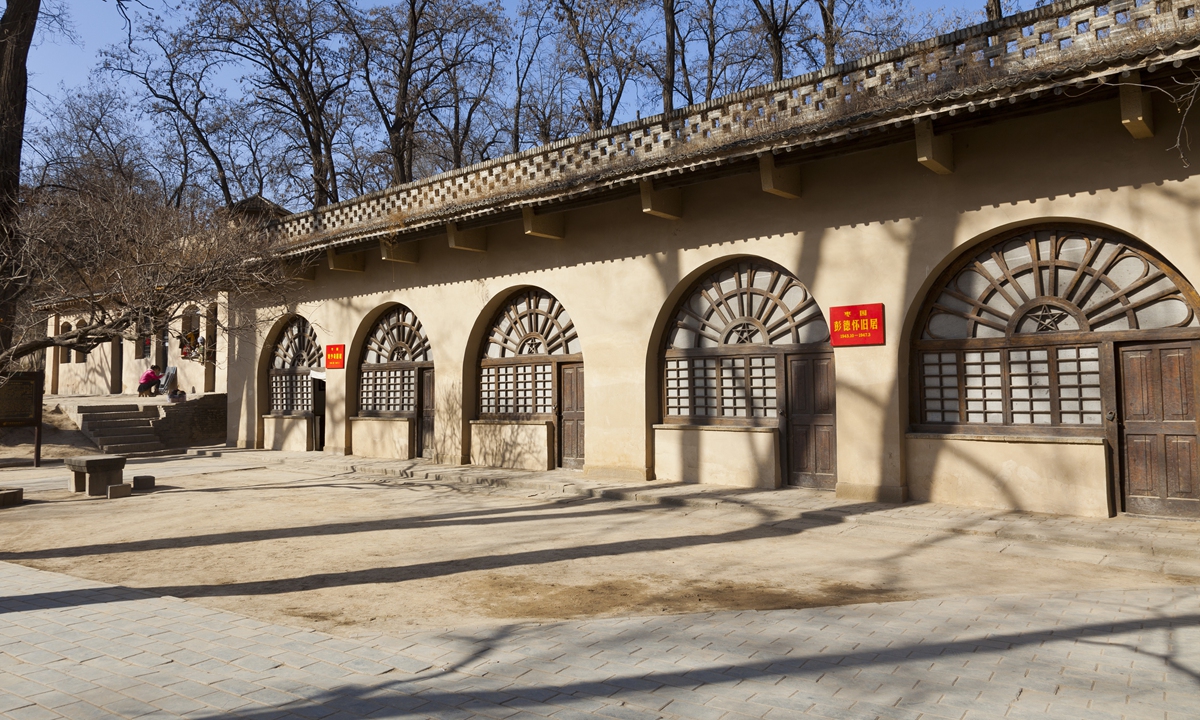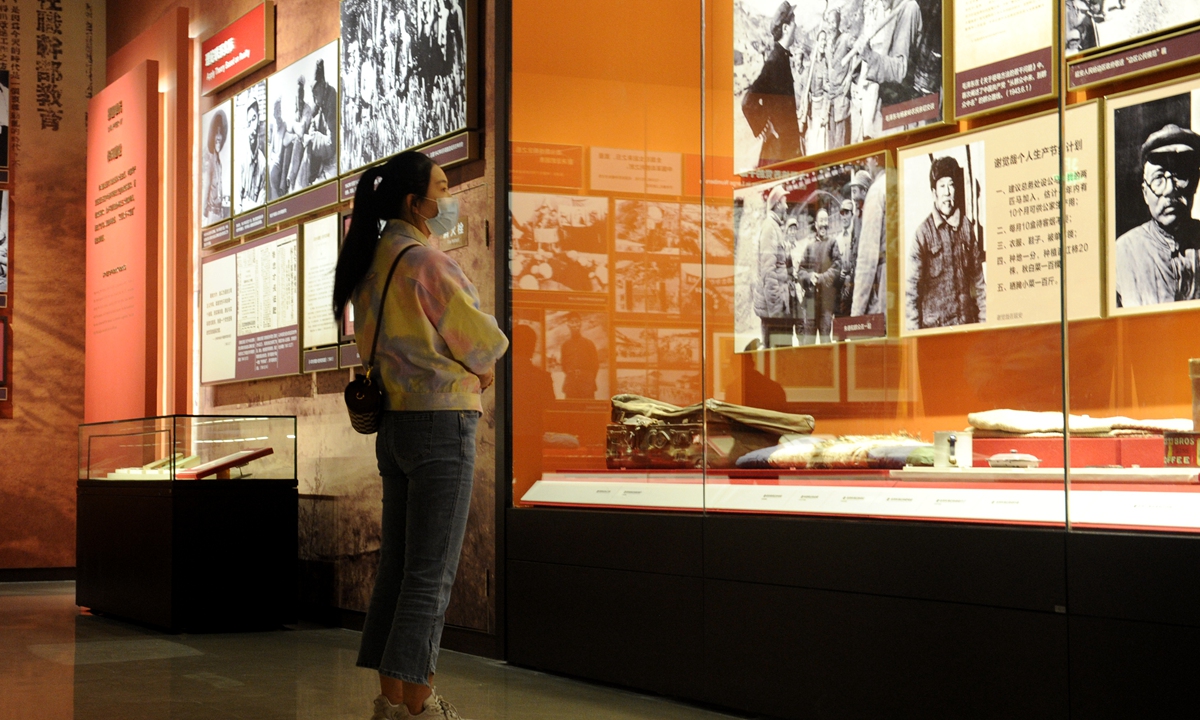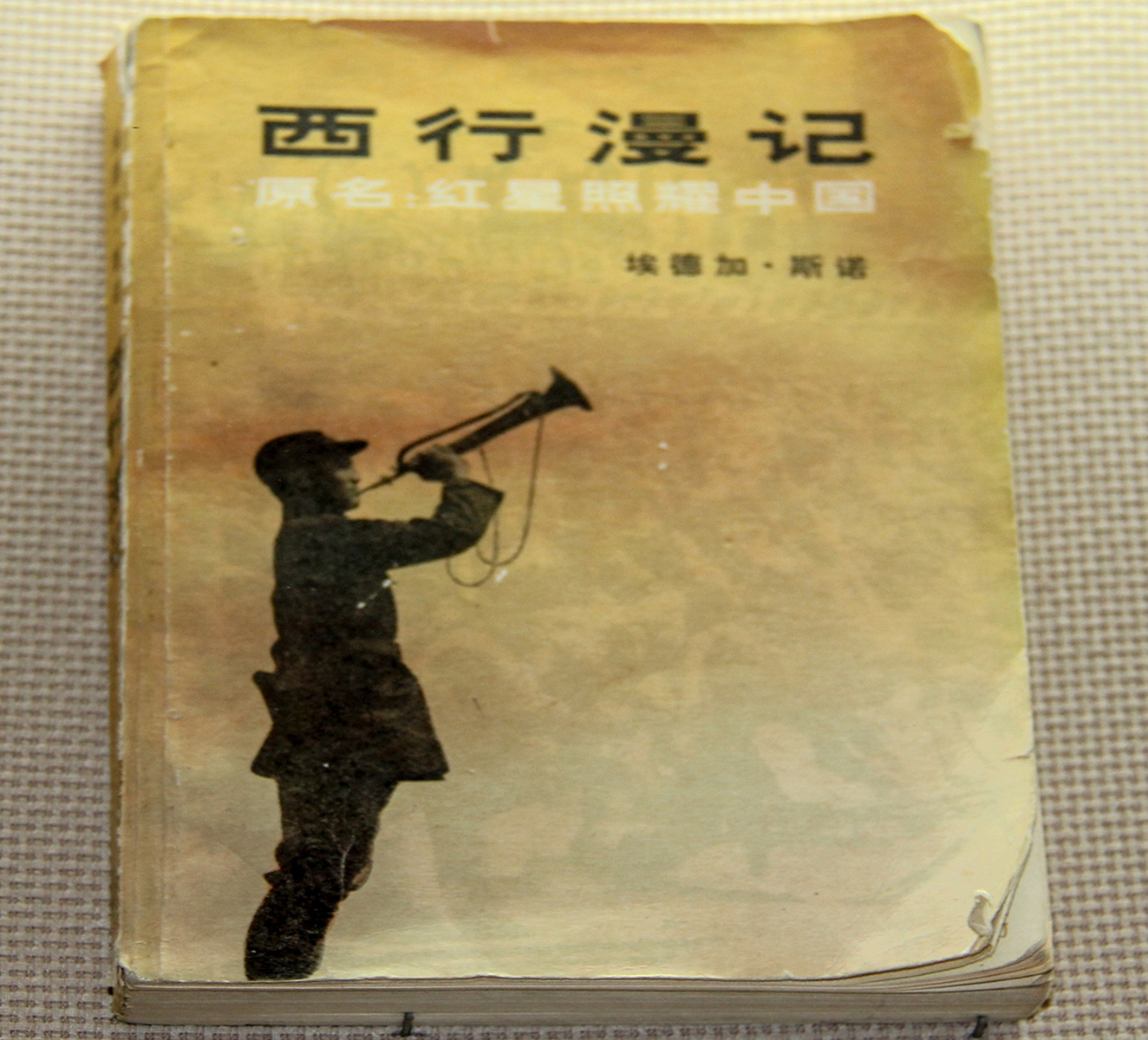
The Zaoyuan Revolutionary Site located in northwest of Yan'an. The first generation of CPC leaders lived and worked here during the Yan'an period. Photo: IC
Less than one week after the conclusion of the 20th National Congress of the Communist Party of China (CPC), Xi Jinping, general secretary of the CPC Central Committee, led the members of the Standing Committee of the CPC Central Committee Political Bureau to visit Yan'an, an old revolutionary base in Northwest China's Shaanxi Province, on October 26.
They were there to pay sacred tribute to the land of the Chinese revolution, revel in the eventful days of the CPC Central Committee in Yan'an in the years of the Chinese revolutionary struggles, commemorate the great achievements made by revolutionaries of the older generation, and manifest the conviction of the new central leadership to carry forward CPC's revolutionary fighting spirit legacy and present a road map on what is to be expected in China's future, drawing a road map or the prosperity and achievements to come.
"I lived and worked in Yan'an for seven years," Xi said affectionately.
"My elder generation also once lived here, and I am quite familiar with the region. When I was sent to northern Shaanxi and worked in the fields as a farmer, every time I got a chance to come to Yan'an, I would visit those revolutionary sites, including the site of the Seventh CPC National Congress, Yangjialing, Zaoyuan, and Fenghuang Hill. After working in the CPC Central Committee, I've paid three inspection tours here," said Xi, who is also president of China and chairman of the Central Military Commission.
"This time, with members of the Standing Committee of the CPC Central Committee Political Bureau, I come here to manifest that the new central leadership will inherit and carry forward the glorious traditions and fine work styles of the Party cultivated during the Yan'an period, and carry forward the Yan'an spirit," Xi said during the visit.
Some local residents in the CPC's former revolutionary base, which is also hailed as a sacred site for the Chinese revolution and cradle of the New China, told the Global Times that the visit shows that the CPC Central Committee attaches great importance to the Yan'an spirit fostered by revolutionaries and communist members from the older generation during their years in Yan'an, which has become an invaluable source of inspiration for the Party.
The CPC Central Committee's stay in Yan'an is one of the most significant parts of the Party's history. Having remained in Yan'an for 13 years, the CPC Central Committee led China's revolutionary endeavors to their peak, achieving a historic turning point - the founding of the People's Republic of China in 1949.
The Yan'an spirit, which was forged during this period, has become the CPC's most precious treasure. It calls for firmness in correct political orientation, emancipation of the mind, seeking truth from facts, serving the people wholeheartedly, and developing self-reliance and encouraging pioneering efforts.
"In the course of the 13 years, the CPC became a fully mature political entity complete with its own ideology, culture, and military, forming a core leadership in shaping ideology and guiding the team, which was the first glorious period of the Party," Zhang Xixian, a professor at the Party School of the CPC Central Committee in Beijing, told the Global Times.
Now the CPC has embarked on the journey toward achieving its second centennial goal, which means the Party is marching toward the most mature and glorious period which echoes the historical zeitgeist, Zhang noted. "How the Party march forward without losing the direction? It's about seeking the direction, the belief and spirit in Yan'an," he said.

A tourist visits the Yan'an Revolutionary Memorial Hall on May 1, 2022. More than 4 million people visit the memorial hall each year. Photo: IC
What is the Yan'an spirit Yan'an served as the CPC's headquarters from 1935 to 1948, which was also the period that witnessed the CPC's growth from obscurity to a formidable political power. From that period, the Shaanxi-Gansu-Ningxia Border Region surrounding Yan'an also served as the political guidance center for the Chinese People's War of Resistance against Japanese Aggression (1931-45) as well as the general backing for the Chinese People's War of Liberation (1945-49).
In 1938, when replying to the question "What should be learned at the Military and Political University of Resistance Against Japanese Aggression in Yan'an," Comrade Mao Zedong pointed out, "First and foremost, we need to learn about a political direction."
The firm and correct political direction was the essence of the Yan'an spirit - an invaluable source of inspiration for the Party that should be passed down from generation to generation, Xi said during the visit.
In the eyes of Chinese experts, the Yan'an spirit has a great practical significance today, which was also underscored in the Party's congress.
"The practical significance of the Yan'an spirit today is that we should always adhere to the correct political direction firmly as the Party firmly placed its political direction at the first place during the period in Yan'an," Zhang said.
In 1941, CPC troops initiated a large-scale production campaign in Nanniwan, a small town located about 40 kilometers south of Yan'an. The move created a land of abundance and realized self-sufficiency amid military and economic sieges by the Kuomintang (KMT) forces. The miraculous achievement came through hard work and self-reliance, which also constitute an important part of the Yan'an spirit.
Hou Xiuzhen, 76, and her family have kept precious photos chronicling the history of the large-scale production campaign in Nanniwan. As the daughter-in-law to a veteran of the brigade of the Chinese Eighth Route Army which led the campaign at that time, she has witnessed the great change of the town over the last half-century.
"Xi's visit to Yan'an shows that the CPC Central Committee pays the greatest importance to this place, to the Yan'an spirit," Hou told the Global Times on Sunday. "In my view, it represents self-reliance and hard work."
At the beginning of the a large-scale production campaign, there was no place to live, not enough food to eat, but step by step, we transformed this place into a beautiful site thanks to our spirit of resilience, and we need to pass on this spirit from generation to generation, she noted. "Without the hard work of our revolutionary predecessors, there would be no good days today," Hou said.
Nanniwan is where the CPC industrialized the wilderness, against all odds, according to the website of Shaanxi provincial government.
It hosted a large-scale production campaign that transformed vast swathes of thorny no-man's land into productive terrain between 1941 and 1944, as a solution to the KMT blockade along the Shaanxi-Gansu-Ningxia border, the website showed. The Eighth Route Army's 359th brigade converted wasteland into productive land, creating rice paddies, cave houses, and workshops, with only the most rudimentary of hand implements at best and often nothing but their bare hands.
"Some Chinese youth do not understand where our good days came from; they don't have a chance to live through what the old generations had endured, and some young people don't know that China has grown stronger through struggling and fighting," Hou said. Such a fighting spirit needs to be carried on, she said.
During the Yan'an period, our Party put forward the fundamental principle of serving the people wholeheartedly and wrote it into the Party Constitution, emphasizing that "the contingent of the CPC was established for the liberation of the people and always stood ready to work for their interests," and requiring all Party officials to "stand firmly on the side of ordinary people," and thus bringing about a vivid picture in which "officials were all public servants in people's eyes," Xi stressed during the latest Yan'an trip.
"The power gathered in Yan'an helped the CPC fight against fascism, which also amazed the world," Zhang Shuhua, director of the institute of political sciences at the Chinese Academy of Social Sciences, told the Global Times on Sunday.
When the new CPC leadership has been chosen, a visit to a sacred site linked to the Chinese revolution is a very good tradition upheld by the CPC Central Committee. Besides the interpretation of the Yan'an spirit, the trip is also considered a unifying force for the hard work and goals meant to be achieved ahead, as the CPC members adhere to a firm position in the face of rising uncertainties in the world, Zhang Shuhua said.
"We are in a much better position today compared to the past. What the CPC needs to do now is reject formalism and bureaucratism - the two greatest enemies to our cause, and we need to work hard together with the people in order to - like they did during their period in Yan'an - forge close ties with the people and unify all the forces to achieve our goals," Zhang Shuhua said.

The Chinese translation of the book Red Star Over China written by Edgar Snow Photo: VCG
Long-lasting inspiration "The Yan'an spirit represents an important time of struggle in China's developing history, and it became a symbol of hope for many young Chinese people who were disgusted with the extreme corruption and cruelty of the KMT," Eric Foster, nephew of the well-known Western journalists Helen Foster Snow (1907-97) and Edgar Snow (1905-72), told the Global Times over the weekend.
Edgar Snow, a household name in China, was a journalist from the US best known for his 1937 book entitled Red Star Over China which portrayed a clear and compelling image of how the then "mysterious" CPC led the revolution and brought human dignity and equality to the masses via Snow's observations in Yan'an.
Edgar Snow's wife, Helen Foster, was also a great figure in presenting the CPC to the world through first-hand accounts about CPC's leaders and the CPC-led Red Army.
They were among the first journalists to share the truth about who the CPC members were and the good that they were fighting for in Yan'an, Eric Foster said.
"When you have all these brave forces coming together in one place and all believe and are willing to sacrifice and fight for the same cause, because they know from the bottom of their hearts that this is a right and just cause, and the right path for China, then it seems this is when the magic of something more can happen, and thus you get the Yan'an spirit," said Eric Foster. He visited Yan'an in 2021 to track down the spirit that attracted Edgar and Helen Snow.
"To me, what has kept the CPC in good standing with the people is all the tremendous progress that has been made at all levels of society. So Yan'an played a key role in helping China to become the new China that we have today," he said.
"This Yan'an spirit is alive today for the many people who come to visit and learn about the great sacrifices of both the men and women at that time," said Eric Foster.
Over the last couple of weeks, the world has closely watched the CPC's national congress, trying to learn how the Party has achieved so many and how it will continue leading the country to realize the second centennial goal of transforming China into a great modern socialist country in all respects and advance the rejuvenation of the Chinese nation on all fronts through a Chinese path to modernization.
Yan'an is of great practical significance for clearly seeing why Chinese people have been successful in the past and how they can continue to be successful in the future. The practical significance of the Yan'an Spirit is to seek rejuvenation for the Chinese nation, to seek happiness for the people, and to seek great harmony for the world, Mohammad Saiyedul Islam, a Bangladeshi journalist based in China, told the Global Times after he visited the Yan'an Revolutionary Memorial Hall and other historical sites in Yan'an.
The powerful and inspirational spirit created by the CPC is undoubtedly a strong driving force for the people in moving forward bravely, he said.
In a cave home on the Loess Plateau, a historic conversation took place in 1945 between late Chairman Mao Zedong and Huang Yanpei, a non-Communist personage, on how to maintain the long-lasting success of political power when talking about breaking the country's historical cycle. Mao gave an answer: Supervision by the people and the due diligence of people working in public office.
Through painstaking efforts, the CPC has found a second answer to the question of how to escape the historical cycle of a rise and fall, Xi said in the report delivered to the 20th CPC National Congress. The answer is self-reform.
We have ensured that the Party will never change its nature, its conviction, or its character, he said.
The central leadership's visit to Yan'an is also considered as tracing the roots of the CPC, Zhang Xixian said.
"The first answer is supervision by the people and the second answer today is self-reform. CPC members can't and shouldn't forget their traditions and they need to pass on the Party's spirit from generation to generation," he said.






